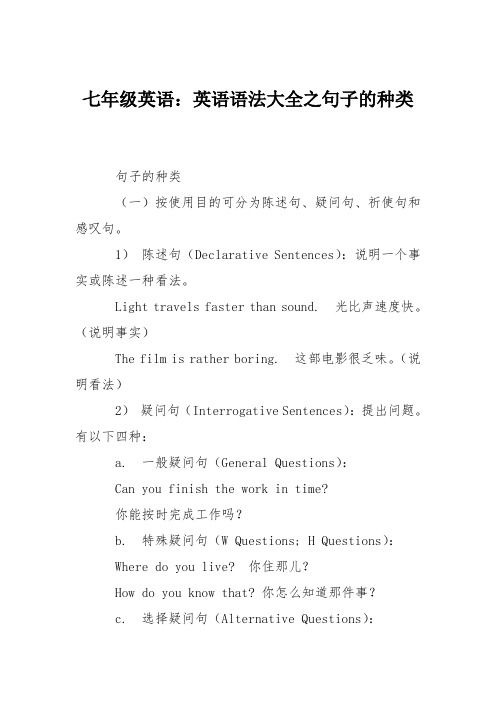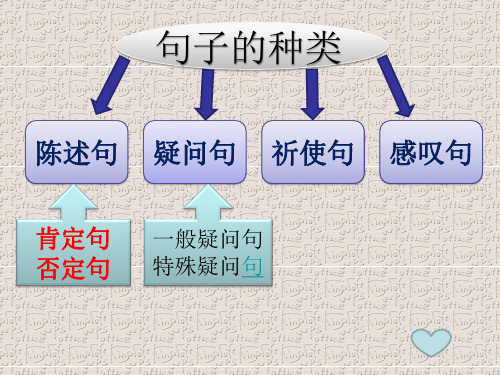七年级英语句子的分类.ppt
第三讲英语句子的功能分类(1).

第三讲英语句子的功能分类按照交际功能 1,英语句子大致可以分为四类:陈述句(declarative sentences 、疑问句 (interrogative sentences 、祈使句 (imperative sentences 和感叹句 (exclamatory sentences 。
这一讲我们将主要复习这些句子类型的结构特点及其使用语境。
(第23页一、英语中的陈述句顾名思义,陈述句主要是用来陈述事实,传递信息,提供情况。
(23页3.1:Declarative sentences are used to describe some state of affairs, to introduce some properties or features, or to portray some action.陈述句可以有肯定和否定两种形式。
如:23页:(一 Jack is in school.Grammar can be interesting.We ’ re having grammar class.(二I didn’ t tell him anything.He never smokes cigarette.I hardly know the people there.She scarcely spoke to him.No students will take the course.Nobody will agree to this project.I can do nothing about it.(三 That will be, I think, too much for him.You ’ ll be caught in the rain, I’ m afraid.I ’ ll have another cup, if you please.If you don’ t mind, I’ d like to think about it for a minute.He might be right.She seems to be unhappy.He appears to have many friends here.二、英语中的疑问句疑问句的主要交际功能是提出问题和询问情况,分为一般疑问句(simple questions 、特殊疑问句 (Wh-questions 、选择疑问句 (alternative questions 、反意疑问句 (tag questions 。
七年级英语:英语语法大全之句子的种类

七年级英语:英语语法大全之句子的种类句子的种类(一)按使用目的可分为陈述句、疑问句、祈使句和感叹句。
1)陈述句(Declarative Sentences):说明一个事实或陈述一种看法。
Light travels faster than sound. 光比声速度快。
(说明事实)The film is rather boring. 这部电影很乏味。
(说明看法)2)疑问句(Interrogative Sentences):提出问题。
有以下四种:a. 一般疑问句(General Questions):Can you finish the work in time?你能按时完成工作吗?b. 特殊疑问句(W Questions; H Questions):Where do you live? 你住那儿?How do you know that? 你怎么知道那件事?c. 选择疑问句(Alternative Questions):Do you want tea or coffee?你是要茶还是要咖啡?d. 反意疑问句(Tag-Questions):He doesn’t know her, does he?他不认识她,对不对?3)祈使句(Imperative Sentences):提出请求,建议或发出命令,例如:Sit down, please. 请坐。
Don’t be nervous!别紧张!4)感叹句(Exclamatory Sentences):表示说话人惊奇、喜悦、愤怒等情绪,例如:What good news it is! 多好的消息啊!(二)句子按其结构可以分为以下三类:1)简单句(Simple Sentences):只包含一个主谓结构句子叫简单句,例如:She is fond of collecting stamps. 她喜欢集邮。
(主) (谓)2)并列句(Compound Sentences):包含两个或两个以上主谓结构的句子叫并列句,句与句之间通常用并列连词或分号来连接,例如:The food was good, but he had little appetite.(主) (谓) (主)(谓)食物很精美,但他却没什么胃口。
英语句子结构详细讲解

英语句子结构详细讲解一.句子成分分析1.主语(subject)句子的主体,全句述说的对象。
一般由名词,代词,数词,不定式,动名词,从句担任,常置于句首。
(名词)(主格代词)(数词)(不定式)(动名词)(主语从句)2. 谓语(predicate)对主语加以陈述,表示主语的行为或状态,常用动词或者动词词组担任,放在主语的后面。
谓语分为简单谓语和复合谓语(1).简单谓语由一个动词或者动词短语构成at 6 o?clock.(动词)(动词短语)(2).复合谓语①由情态动词或其他助动词加动词原形构成(情态动词+动词原形)She (助动词do+动词原形)(助动词has+动词原形)补充:协助主要动词构成谓语动词词组的词叫助动词(Auxiliary Verb)。
被协助的动词称作主要动词(Main Verb)。
最常用的助动词有:be, do, have, shall, will, should, would. 助动词自身没有词义,不可单独使用,例如:He doesn't like English. 他不喜欢英语。
(doesn't是助动词,无词义;like是主要动词,有词义)②由系动词加表语构成(即主系表结构)(状态系动词be+表语)(表象系动词look+表语)补充:系动词亦称联系动词(Link Verb),作为系动词。
有些不具词义;有些具有词义,但不能单独用作谓语,后边必须跟表语(亦称补语),构成系表结构说明主语的状况、性质、特征等情况。
1.状态系动词用来表示主语状态,只有be一词,例如:He is a teacher. 他是一名教师。
(is与补足语一起说明主语的身份。
)2.持续系动词用来表示主语继续或保持一种状况或态度,主要有keep, rest, stay, lie, remain, 例如:He always kept silent at meeting. 他开会时总保持沉默。
This matter rests a mystery. 此事仍是一个谜。
七年级英语《句子成分》11 - 副本

—— 句子成分介绍
郴州市六中 王智宏
2
1.概念: 组成句子的各个部分叫句子成分。
3
1.概念:
组成句子的各个部分叫
。
2.包含:主语、谓语、宾语、定语、
状语、宾语补足语、表语等。
4
句子成分
含义
主语
表示句子说的是“什么 人”或“什么事物”。
充当词类
5
句子成分
含义
充当词类
主语
表示句子说的是“什么 人”或“什么事物”。
two nice photos
4. There are many people in the room. 5. How much amreantyhepesoopcleks?
the socks
18
思考:主语一定在句首吗?
主语不一定在句首!
在 句, 句中,主语常在 句中或者句尾。
1. Do you have a ping-pong bat? 2. Here are two nice photos.
名词、不定式、
动名词等
10
11
句子主要说明的人或事物。
常位于句首。
12
The man likes reading. 主语是人 Reading is his favorite. 主语是事
13
1. The sun is big. (名词)
2. He likes reading.
(代词)
3. Six is my lucky number. (数词) 4. Running is great. (动名词)
2. He has a car. (谓)
3. Don’t be late. (主谓)
祈使句,省略主语 you
初中英语单词ppt课件

英 语
第3讲 七年级(下)Units 1-6
1.sing(v.)→ song (n.)歌曲→ singer (n.)歌手 2.speak(v.)→ spoke (过去式)→ spoken (过去分词) 3.write(v.)→ wrote (过去式)→ written(过去分词)→ __w__ri_te_r____(n.)作者 4.teach(v.)→ teacher(n.)教师 5.up(adv.)→ down (反义词)向下 6.tooth(n.)→ teeth (复数)牙齿 7.early(adj.)→ earlier (比较级)→ earliest (最高级)→ _____la_t_e___(adj.反义词)晚的 8.run(v.)→ runner (n.)跑步者→ running (现在分 词)→ ran (过去式) 9.new(adj.)→ old (adj.反义词)旧的 10.many(adj.)→ more (比较级)→ most(最高级) 11. leave(v.)→ ____le_f_t___(过去式)
in the morning and come back home at seven in the evening. 5. He is in Class One and I am in Class Two. 6. He was fond of drawing when he was yet a child. 7. Neither has he changed his mind, nor will he do so. 8. What he said at the meeting is very important, isn’t it? 9. The farmer is showing the boy how to plant a tree. 10. Both Tom and Jack enjoy country music.
七年级英语句子的分类(完整版).ppt

根据答语写问句(有的答案可以多样)
1. Yes, I like music very much. 2. No, it isn't. Music is my favorite. 3. My favorite color is green. 4. Because it's fun. 5. My birthday is on February 5th. 6.
2. Tom likes peaches. Does Tom like peaches?
一般疑问句的肯定回答、 否定回答。
Yes,… 代词主格+关键词。
No,…代词主格+关键词 +not.
1.Is she a pupil? Yes, she is.
No, she is not./No, she isn`t. 2.Can you see a star?
据实回答
1. Does your father eat fruit after dinner? 2. Is your birthday before(在...前) July? 3.Where is your math book? 4. What color do you like? 5. Do you have art on Wednesday? 6. Why do you like computer? 7. How much is your pen? 8. What's your favorite day? 9. Who is your history teacher? 10. When is your mother's birthday?
Yes, I can.
No, I can not./No, I can`t.
初中英语句子种类讲解(PPT52张)

newspaper when I
came in. ❖She is the girl who
sings best of all.
定语从 句
❖It is well-known that the 2008 Olympic Games will be held on August 8th.
主语从句
❖As is known to all, the
neither…. nor…. ▪ 转折并列连词: but,while,yet
▪ 因果并列连词: for, so
▪ 选择并列连词: or
请用合适的并列连词把每组句子合
并为一个并列句。 1.He was tired. He went to bed.
He was tired, so he went to bed.
<2>. Do you know what w\as
happened yesterday? (改错)
3. _主__语___+__谓__语__+__宾__语___(_S_+V+O)
We are having an English class.
Mr Wang will attend the lecture.
★高考经常考查的系动词:
<1>. “变得”g_e_t____b,e_c_o__m_e__,
_t_u_r_n___, _g_o_____, _g_r_o_w_...
<2>. “看起来”lo_o__k___s,_e_e_m___,_a_p_p__e_ar “闻起来”s_m__e_ll__ “尝起来”taste
感叹句结构
感叹句通常有what, how引导,表示赞美、惊
句子的种类(52张PPT)初中英语专项复习课件

助动词/情态动词+主语+ night?
谓语+其他?
Why can’t you answer the
question?
续表
The red one.
特殊疑 问句
答语
根据实际情况作出相应的 回答
My key to the bike. I went to the park with
my
friends.
Because it is too difficult.
谓语 是否定中心成分,则仍视 I have told you not to play
动词 为肯定句,附加疑问句部 computer games so much,
分用否定结构
haven’t I?
续表
反意疑 问句
若陈述句部分含有否定
附加 前、后缀,如un-, dis-, 疑问 -less等构成的词,该陈述 He is unhappy, isn’t he? 句部 句仍然视为肯定句,附加
反意疑 问句
陈述句(肯定式)+附加 结构 疑问句(否定式)?
陈述句(否定式)+附加 疑问句(肯定式)?
You are from Guilin, aren’t you? You didn’t get up at 6:00, did you?
续表
反意疑 问句
与一般疑问句的答语相 同,但注意在回答“前否 答语 后肯”的反意疑问句时, yes和no在意义上的变化 (此时yes的意思是 “不”,no的意思是“是”)
式)
—Neither is Jenny.
So+主语+ 助动词/情态动词/be动词. 意思 —Li Ming is a brave boy. 是:主语确实如此(和前面的情况相符) —So he is.
